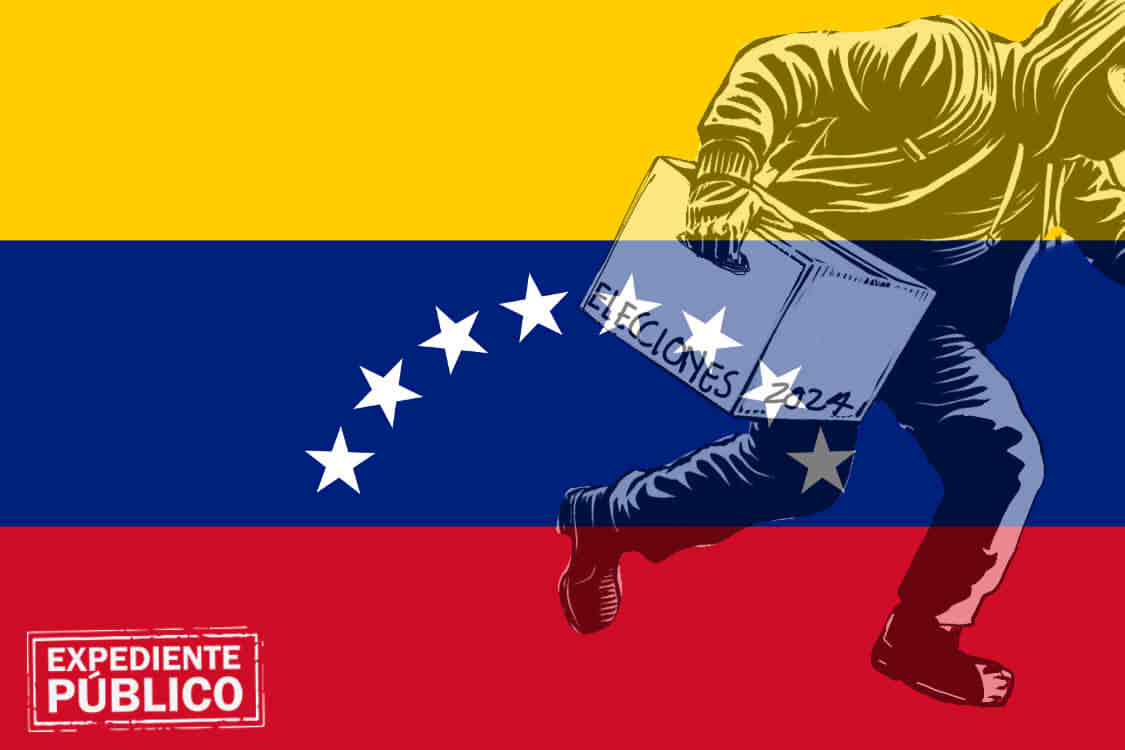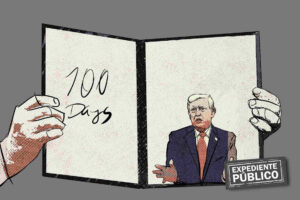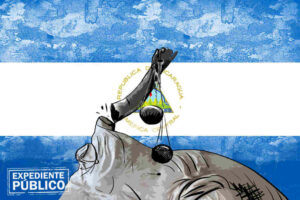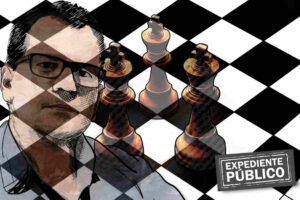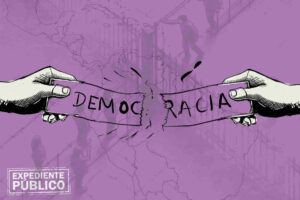* All the scenarios presented by reputable surveys show the opposition candidate Edmundo González Urrutia surpassing Nicolás Maduro in Venezuela.
** Even moderate chavistas see the need for change, and very few of Nicolás Maduro’s sympathizers are willing to vote.
*** The designation of the Electoral Power, inequality in access to campaign resources, and manipulation of the scrutiny system are part of the manipulation practices.
Expediente Público / Special from Caracas
For the first time this century, chavismo faces a high possibility of losing power. Since Hugo Chávez won the elections in 1998 with 56% of the votes, support for his movement has never been as low as it is now.
The latest known surveys give a wide margin of preference in terms of voting intention to the candidate of the Movement for Democratic Unity (MUD), former ambassador Edmundo González Urrutia.
A study presented by the Delphos Institute, based on fieldwork conducted between July 5 and 11, gives the opposition candidate 59.1% of the vote intention, while the incumbent Nicolás Maduro reaches 24.6%.
MUD is also supported by the parties Un Nuevo Tiempo (UNT) and Movimiento por Venezuela (MPV).
Subscribe to the Expediente Público newsletter and receive more information
According to Delphos director Félix Seijas, the current president seems to have stalled, while the former diplomat Edmundo González Urrutia continues to gain preferences.
The 2-to-1 correlation in favor of the opposition could widen during the last days of the electoral campaign, as 12% of those interviewed refused to formalize a position for or against a political change.
In addition, in this survey, 18% of people who recognized themselves as “hardcore” chavistas indicated that a political change is necessary or very necessary.
Machado (Vente Venezuela), a former deputy emerged from Venezuelan civil society, was supposed to be the opposition candidate after having won the primary in October 2023 by a wide margin.
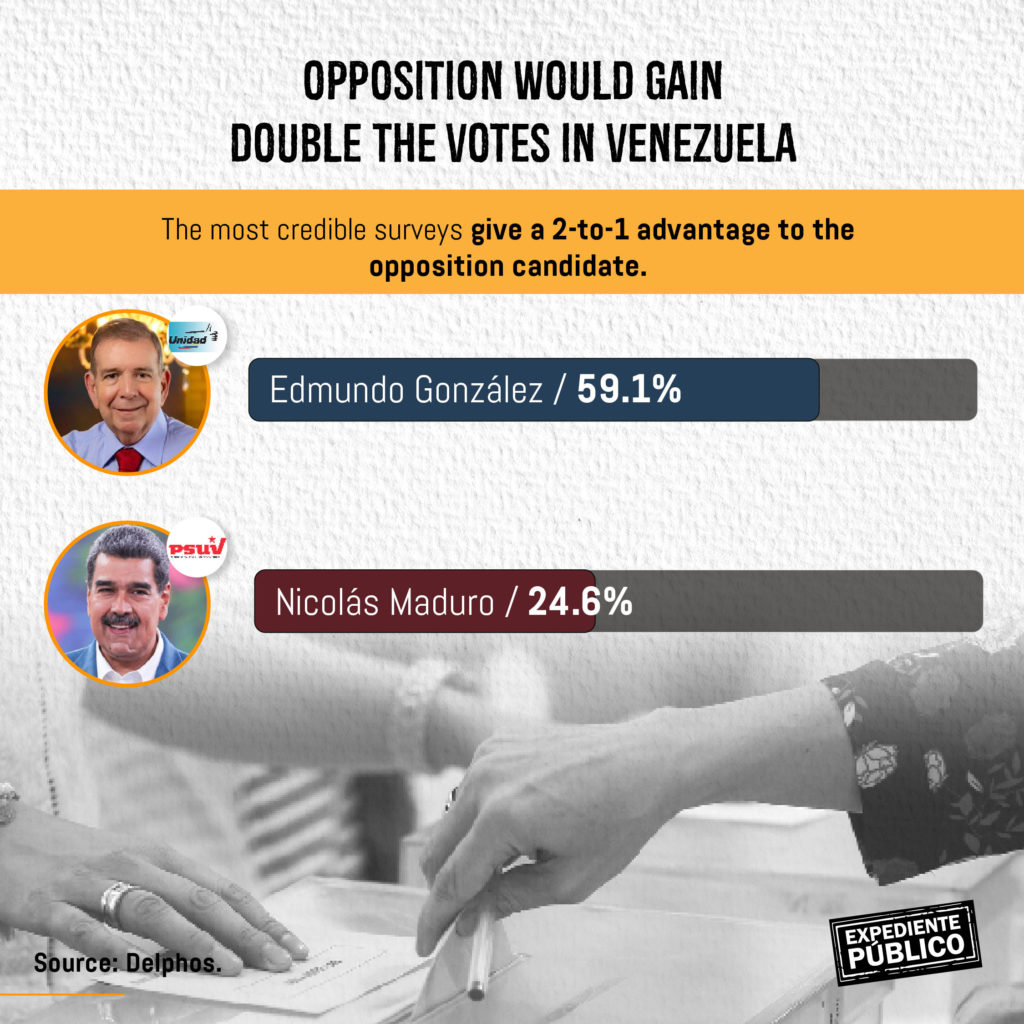
Nicolás Maduro and his traps in Venezuela
But a veto imposed by the government through the Comptroller General of the Republic prevented her from running for the presidency, just like the person she designated to replace her, Professor Corina Yoris.
In a last-minute maneuver, when the deadline to register a substitute was about to expire, the government accepted the option represented by González Urrutia. The merge between Machado’s leadership and the former diplomat has been fully achieved, despite the short time that has elapsed since the formal appointment of the opposition candidate.
In context: The elections in Venezuela are a test to overthrow authoritarianism.
Disheartened chavista base
A survey conducted in June by the firm Consultores 21 determined that voters who prefer Machado and González are identical, and those who have ensured their participation in the elections reach a peak of 63%.
In contrast, only 30% of Maduro’s supporters said they would vote on July 28 in Venezuela.
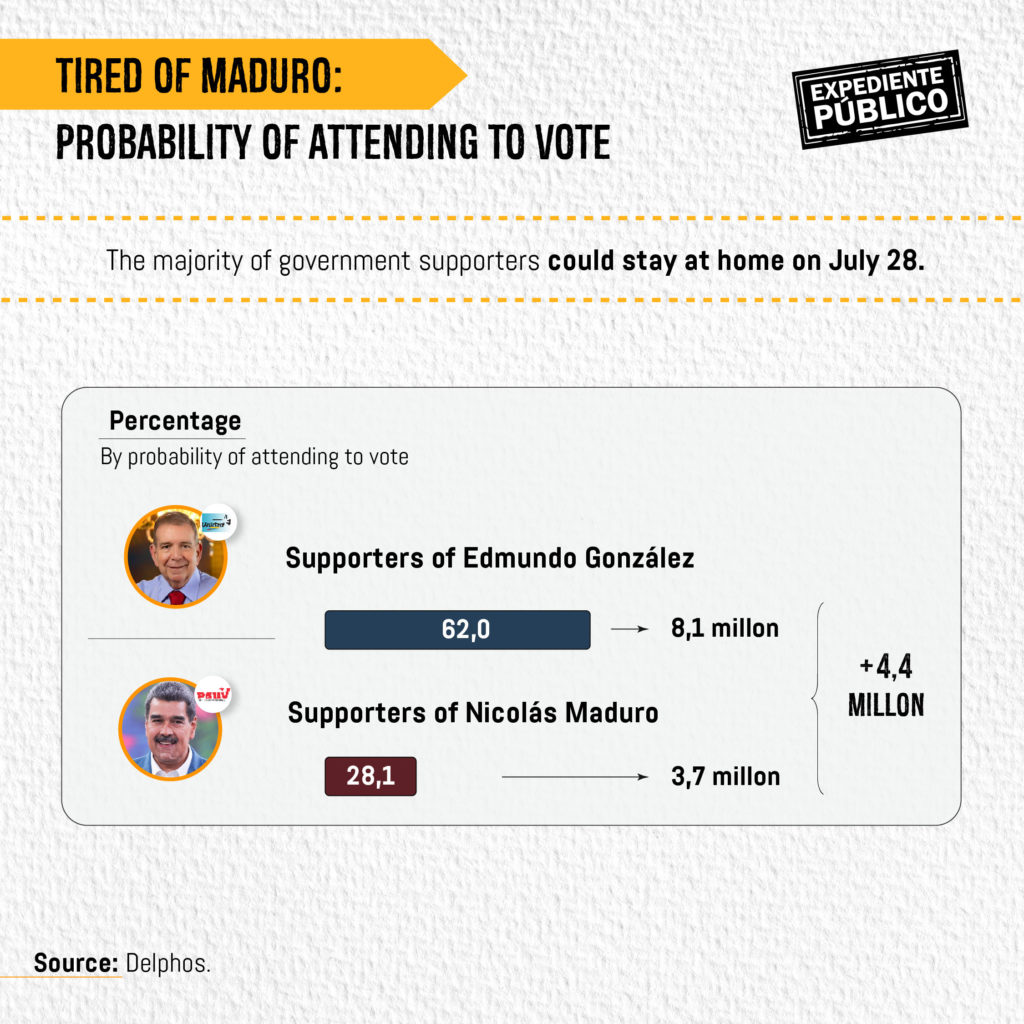
“We have found hardcore chavistas who have set up their small command centers,” Seijas revealed during an exposition of the results of this fieldwork. The “command centers” constitute the core of the in-person defense of opposition votes, promoted by María Corina Machado.
The conditions seem to be in place for a change of political power in Venezuela. However, academic sectors have warned that these elections will be held under fraudulent conditions, designed to favor Maduro’s option.
Shadow of fraud
According to the director of the Center for Political and Government Studies at Andrés Bello University, Benigno Alarcón, the integrity of electoral processes is not defined on the day the vote takes place.
On the contrary, it is the result of a process that begins long before and encompasses factors such as the appointment of the members of the body that will oversee the day, which in Venezuela is the Electoral Power, the existence of a stable regulatory framework; equitable access to campaign resources, as well as the scrutiny and audit system of the results, among others.
“All these things affect the electoral result one way or another. If you remove the opposition candidate, then you no longer have a proper election,” Alarcón explained in a conversation with Expediente Público.
“If you make the opposition invisible because you don’t let them appear in any media and block them from all spaces where they can be seen, then obviously there is no electoral integrity,” he said.
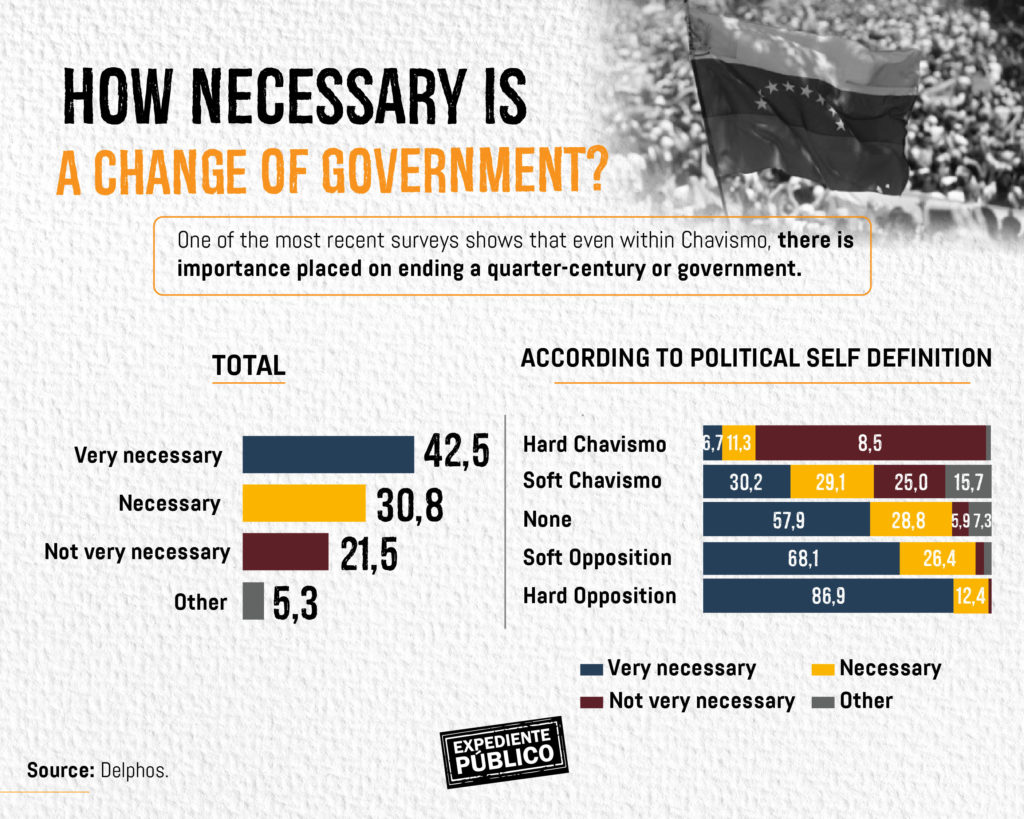
Unequal campaign
Another aspect that delegitimizes an election, according to Alarcón, is the persecution of those who support options other than those in the government.
In the current Venezuelan process, the organs of the state have harassed those who have provided any kind of service or support to the opposition.
On July 14, for example, the tax police body (Seniat) closed the Restaurant La Encrucijada (102 kilometers west of Caracas) shortly after González and Machado made a stop there for lunch.
This practice by the government has been repeated, such that González Urrutia had to issue a video on social media to announce that from then on, he would bring his lunches in a lunchbox.
The latest known act of harassment was the detention of María Corina Machado’s head of protection, Milcíades Ávila.
According to Foro Penal, an entity that keeps track of these actions, with the detention of Milcíades Avila, 77 opposition or independent militants have been deprived of their freedom since González Urrutia’s candidacy was admitted. And as the election day approaches, the count continues to rise.
We left behind the text of the Barbados agreement, signed in October 2023 between representatives of the government and the Venezuelan opposition, mediated by the Kingdom of Norway. In article seven, it established a guarantee for the freedom of movement and assembly and for lifting any measure that could affect the safety of candidates and other political actors.
The “rebanado”.
On the eve of the formal start of the campaign, the government-dominated Electoral Power issued two resolutions to regulate, on one hand, the appointment of witnesses in voting centers, and on the other, campaign and electoral propaganda activities.
Alarcón stated that these decisions, although they have a lower rank than laws, violate a principle established in article 298 of the Constitution, according to which the norm on electoral processes cannot be modified “in the period between the day of the election and the six months immediately prior.”
“You can’t call a soccer game, and when the teams are already playing, start changing the rules,” he explained. This is part of a government strategy to reduce capacities and sympathies for the opposition. Colloquially, it has been called “rebanado.”
“These are mechanisms and tactics through which they undermine the advantage of opposition options. This has to do with the regulatory framework, including issues such as the Electoral Registry, the candidacies on the ballot, and the control of political parties,” Roberto Abdul, director of the civil association Súmate, specialized in electoral process research, explained to Expediente Público.
“These actions are underestimated because they can have implications of one percentage point. But when you add up 10 actions averaging of one and a half points each, they total 15 points,” he added. According to this expert, the biggest share taken from the opposition in the run-up to the presidential process on July 28 was through the imposition of the registration of Venezuelans who have already settled in other parts of the world.
1% of Venezuelans abroad will vote
Abdul estimates that of the so-called “diaspora,” only about 70,000 people will be able to vote. According to the inter-agency network R4V, which monitors Venezuelan emigration, in the last 7 years, 7.77 million people have left Venezuela. Of these, 4.48 million have residence permits, which would theoretically make it possible for them to vote in their places of residence.
Another tactic was to create confusion among independent and opposition voters about where to cast their votes.
Abdul explained that the names of more than 6,400 educational centers, where voting traditionally takes place, were changed. This is to create confusion among people who traditionally voted in those places.
We might think that these decisions could also affect pro-government voters. However, according to the director of Súmate, this is not the case because pro-government mobilization is “structured,” while independent and opposition mobilization is “spontaneous.”
Simultaneously, he noted, voting centers with only one table were assigned to government-built housing complexes. He said there is a higher risk of irregularities there, “as there is no opposition oversight.”
“How much is that? Well, it’s salami slicing one or two points. Reducing the gap is their bet so far,” he said.
Opposition, vote defense.
One of the reasons chavismo has won most of the elections held since the end of the last century is its ability to mobilize its own supporters. This is what Abdul called structured mobilization.
This time, the opposition led by María Corina Machado has designed an electoral mobilization that starts from small groups, called “comanditos” (little headquarters).
Machado’s goal is to group 600,000 people around this figure. Although this figure is unlikely to be achieved, Abdul assured that more than 98% of the voting centers will have opposition oversight.
Alarcón warned about two moves that could occur on voting day. On the one hand, deliberate delays in the installation of the polling stations. It is called “operation morrocoy,” in reference to the Venezuelan tortoise.
On the other hand, there is the possibility that voting centers will be prematurely closed, even when there are people waiting to vote.
Additionally: The Power Machine: How Maduro Weaves His Propaganda Network in Venezuela.
When will voting close?
According to the academic, this risk is based on an ambiguity in the drafting of the rule that governs the operation of polling stations, which was recently reformulated.
He explained that the voting period was extended from 4:00 pm to 6:00 pm, and that to extend the day further in each center, express authorization from the Electoral Power in Caracas will be required. This could be the seed of confrontations between government supporters and opponents. It is worth noting that these days, the public order protection is assigned to the National Armed Forces, whose leadership has openly declared in favor of Maduro’s continuity in the Presidency.
Social-Christian activist and former governor of the state of Táchira, (bordering Colombia) César Pérez Vivas explained that the entity in charge of arbitrating the elections, dominated by the government, has implemented changes in electoral engineering. Hence, the call from opposition leader Machado for people to go in mass to vote very early.
«The goal (of the government) is to create lines in the centers with the highest electoral weight, where the opposition has had the greatest impact historically. We want voting to take place early so that we can ensure the execution of the election in the first half of the day, and that in the afternoon we finish,» he stated when consulted by Expediente Público.
Regime threatens.
Perez Vivas warned that in border states with Colombia, such as Apure, there are polling stations dominated by guerrillas allied to the Caracas regime. Under such circumstances, he indicated, people have been instructed to remain in those places as long as they are not at risk.
Other polling stations have been installed in military barracks or government institutions where the government exercises control. «In the barracks, it is complicated for a witness to enter, due to the nature of a military structure, or in mission bases. But these are centers created for this process, which, although important, will not set the majority trend in an electoral scenario where we have double Maduro’s votes in allpolls,» he assured.
According to Súmate’s analysis, 8,644 polling stations will have one booth, which equates to 54.7% of the voting locations.
Nicolás Maduro stokes confrontation
However, prestigious surveys give a wide advantage to former ambassador Edmundo González over Maduro. Presenting the results of their latest survey, Delphos’ director outlined three scenarios based on the respondents’ expressed certainty concerning their intention to vote. In all these scenarios, the opposition candidacy would win. The difference varies: from 25% among those who will definitely vote to 34% considering the opinion of those who are not very sure they will exercise that right.
Of Interest: Networks Overcome Censorship Despite Unequal Electoral Campaign in Venezuela’s Media
According to Séijas, more and more people are expressing interest in participating. The government knows this as well. One indicator is that Maduro himself, in his interventions to soldiers and police forces, broadcast through official media, warns of the possibility of a «bloodbath» if Edmundo González wins on July 28. Hence, within opposition ranks, the fear remains that the government will enact a last-minute measure to eliminate the MUD voting card or even the candidacy of former ambassador González.
Any of these decisions would be issued through the Supreme Court of Justice, dominated by the government, based on lawsuits that remain shelved.
«Removing the candidate or the card, displacing the opposition, is an act of insurrection against the Constitution. It would be removing the competitor from the game, a coup d’état, and a blow to sovereignty… Practically eliminating the election is what the government would do if it went to that extreme,» warned Pérez Vivas.
Downfall
The actions of paramilitary groups, known as colectivos, have been denounced in reports by organizations such as Human Rights Watch and the UN Fact-Finding Mission. One of the characteristics of these structures is that their actions become more frequent during electoral periods.
Groups like La Piedrita and Tres Raíces have openly declared their interest in supporting Maduro. The main exponent of La Piedrita, Valentín Santana, has posted photos of himself with Russian Federation envoys on social media.
However, according to the representative of the Alejandro Moreno Center for Popular Research, Mirla Pérez, the degree of organization of these groups with communities has diminished. This would reduce the influence of such groups to sectors in the west of the capital, Caracas, and some cities in the interior of the country.
Simultaneously, Pérez indicated, in the areas of influence of the government, the presence of so-called «red flags» will intensify. These are tents installed by government party militants to ensure their supporters vote. Otherwise, there would be reprisals, such as deprivation of food bags, known as Clap, among other actions.
«The purpose is to coerce people in the community to vote for them on election day. What can I tell you from experience? People are saying they will vote for whoever they want and tell the “red flagss” what they want to hear,» he said.

